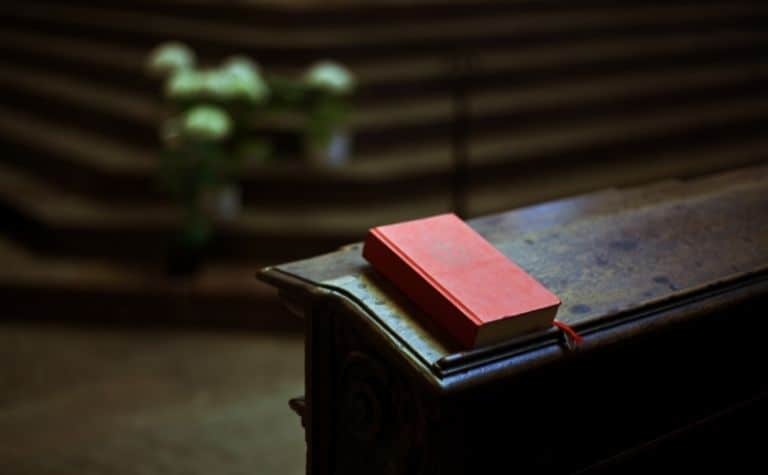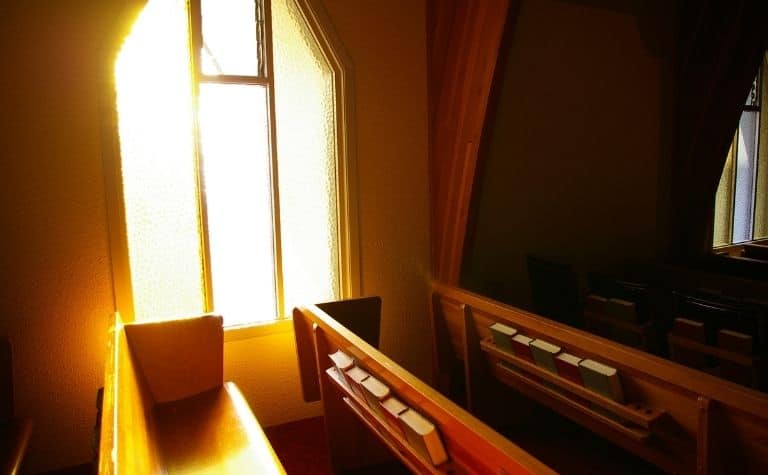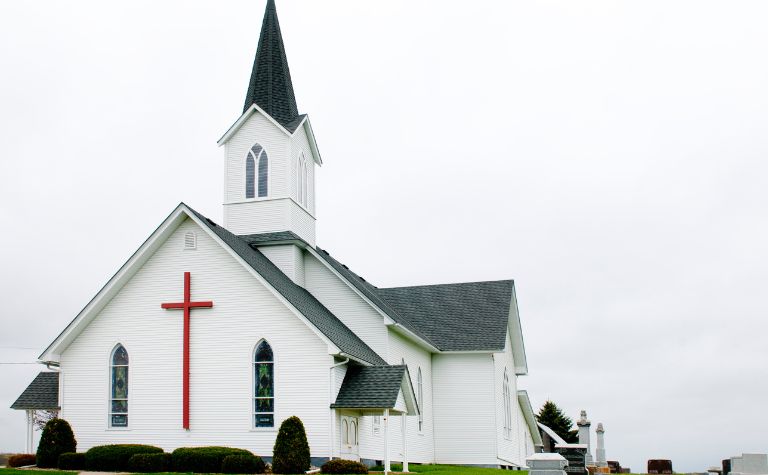Going to church on Sunday morning is a sacred custom for millions of Christians in many cultures around the world. The practice is so embedded in people’s lives that few question why they go on Sunday and not another day of the week.
Protestants worship on Sunday because that’s the day of the week that Jesus rose from the dead. The early church started this practice, as Acts, 1 Corinthians, and Revelation indicate. Some of the earliest Christian writing outside the Bible, as well as secular writing, mention Christians worshiping on Sundays.
When did Christians start worshiping on Sundays? Why did Christians start worshiping on Sundays? Do all Protestants worship on Sundays? When is the Sabbath in Judaism? Keep reading to learn more.

When Did Christians Start Worshiping on Sundays?
The New Testament teaches that Jesus rose from the dead on a Sunday (e.g., Luke 24:1-12; Rom. 8:34; 1 Pet. 1:3). As a result, the early church began gathering together on Sundays to celebrate his victory over death.
However, Luke, Paul, and John do not use the Greek word for “Sunday” (heliou, hemera), likely because of its association with pagan deities. Instead, they use terms like “the first day of the week” or “the Lord’s Day.”
- Acts 20:7, “On the first day of the week, when we were gathered together to break bread, Paul talked with them, intending to depart on the next day, and he prolonged his speech until midnight.” (ESV)
- 1 Corinthians 16:2, “On the first day of every week, each of you is to put something aside and store it up, as he may prosper, so that there will be no collecting when I come.” (ESV)
- Revelation 1:10, “I was in the Spirit on the Lord’s day, and I heard behind me a loud voice like a trumpet.” (ESV)
Some scholars aren’t convinced that the examples above provide overwhelming evidence that the New Testament church met on Sundays. (Also, learn about the Seven Symbols in Protestant Christianity)
However, some of the earliest known Christian literature mentions the early church gathering to worship on Sundays, which aligns with the common interpretation of the aforementioned verses.
For example, Justin Martyr (160-165 AD) wrote, “And on the day called Sunday, all who live in cities or in the country gather together to one place, and the memoirs of the apostles or the writings of the prophets are read, as long as time permits; then, when the reader has ceased, the president verbally instructs, and exhorts to the imitation of these good things.”
He continues, “Then we all rise together and pray, and, as we before said, when our prayer is ended, bread and wine and water are brought, and the president in like manner offers prayers and thanksgivings, according to his ability, and the people assent, saying Amen.”
The Roman governor Pliny (95-110 AD), a source even earlier than Justin Martyr, wrote that Christians gathered together on Sunday mornings and then again later in the day to share a meal (Letter to Trajan, 10.96). (Also, see Protestant vs. Eastern Orthodoxy: What’s the Difference?)

Why Did Christians Start Worshiping on Sundays?
Did the early church have the right to change the day they worshiped? The resurrection of Jesus inaugurated the New Covenant (Jer. 31:31-34; Luke 22:20; Heb. 9:15). (Also, see Protestant vs. Lutheran: What’s the Difference?)
Under the New Covenant, believers have the freedom that includes what day they worship (Rom. 14:5-6; Gal. 4:8-11). Other factors likely played a role in the change as well:
- The resurrection of Jesus occurred on a Sunday
- Jesus appeared and taught his disciples on a Sunday (Matt. 28:1, 9; Luke 24:13-34; John 20:19, 26)
- Pentecost occurred on a Sunday (Acts 2:1-47)
- The early church wanted to distinguish itself from the Saturday Sabbath in Judaism (e.g., Luke 24:1)
Did Constantine establish Sunday worship? No. Some people claim that the Roman emperor Constantine (272-337 AD) commanded all Christians early in the 4th century AD to start observing Sabbath on Sundays instead of Saturdays since this corresponded to the day of the pagan sun god.
No such edict ever took place, and there’s overwhelming historical evidence that the church met on Sundays long before Constantine. (Also, see Do Protestant Churches Observe Lent?)
Are There Any Protestants That Don’t Worship on Sundays?
There are Christians who gather for church on Saturdays rather than Sundays. The largest group is the Seventh-Day Adventists.
Where do Seventh-Day Adventists come from? In the 19th century, a Baptist preacher named William Miller claimed that Jesus would return between 1843 and 1844. Although this prophecy did not come true, his followers still stressed the closeness of the return of Jesus. (Also, see Protestants vs. Pentecostals: What’s the Difference?)
The movement encouraged lay people to examine the whole Bible for themselves instead of simply trusting the interpretations of priests and pastors. This led many Adventists to observe the Sabbath on Saturday instead of Sunday.
The movement has morphed and changed throughout the years, but the largest group by far is the Seventh Day Adventist church, with over 21 million members. Seventh-Day Baptists are another group of churches that meet for worship on Saturday instead of Sunday. (Also, see Protestant vs. Evangelical: What’s the Difference?)
Seventh-Day Adventists believe that Christians should still observe the Sabbath because it’s found in the Ten Commandments, which are God’s eternal decrees. They also point out that the Bible does not mention any other day as Sabbath besides Saturday.
Another important component of the argument is the claim that the early church still observed Saturday Sabbath but with a new emphasis. Constantine, according to this line of reasoning, is the one that changed the observance of the Sabbath from Saturday to Sunday. (Also see Do Protestants Have Confession?)
Sabbath for Seventh-Day Adventists draws its origins from God resting on the seventh day of creation. He rested, not because he was tired, but to enjoy the created world that he had just made.
Christians should follow God’s example and use the Saturday Sabbath to creatively enjoy God’s good creation. By keeping the Sabbath, Christians are experiencing a foretaste of the rest and enjoyment they will possess in heaven. [2]

When is the Sabbath in Judaism?
For Jews, the Sabbath is a 25-hour observance that begins just before sundown on Friday and lasts all the way until the completion of nightfall on Saturday.
Sabbath, otherwise known as Shabbat, is not just a day to cease working but is also a time for both physical and spiritual delights.
In some ways, the Sabbath serves as a reminder of the purpose of the universe: to worship God by enjoying his creation. It also is a time for Jews to memorialize their rescue from slavery in Egypt and help them experience a small amount of the next world. (Also, see Do Protestant Churches Have Nuns?)
Although Sabbath draws its origins from the Torah, which is the first five books of the Old Testament, Jewish Rabbis, throughout the years, compiled a complex list of forbidden labors. In addition, they also developed an assortment of meals and rituals to perform throughout the 25-hour period.
The celebration of the Sabbath begins at home with both family members and guests, sometimes starting as early as midweek to prepare for Sabbath. Families then perform a candle-lighting ceremony to kick off the Sabbath celebrations. (Also, see Protestants vs. Puritans: What’s the Difference?)
There are three special meals throughout Sabbath, two of which begin with a kiddush, which is a ceremonial prayer of blessing. It’s also tradition, at some point, to read a portion of the Torah, following along with the year-long cycle of liturgy. [3]
References:
[1] Source
[2] Source
[3] Source
Related Questions
Catholic vs. Protestant vs. Orthodox: What's the Difference?
Roman Catholicism, Protestant Christianity, and the Eastern Orthodox Church are the three historical branches of the Christian religion. Each tradition traces its doctrines and practices to the New...
Protestantism and Eastern Orthodoxy are two of the three historical branches of the Christian faith, along with Roman Catholicism. Though the Orthodox tradition is approximately 500 years older than...
